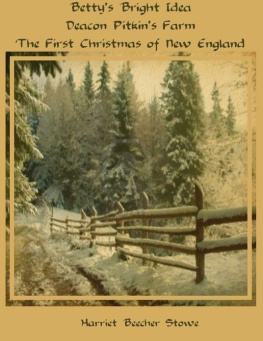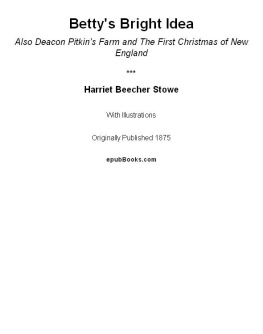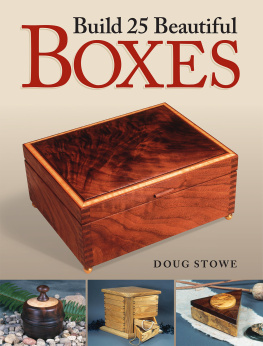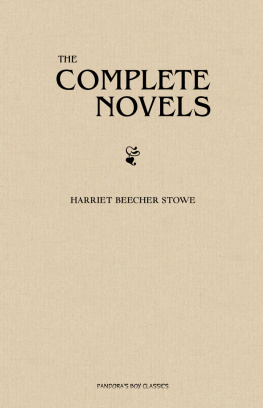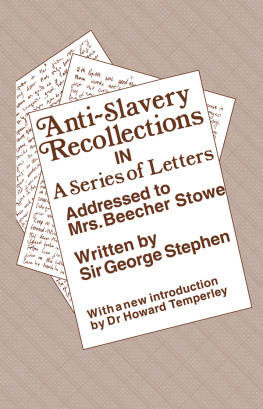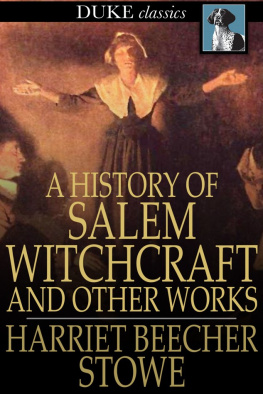BETTY'S BRIGHT IDEA.
"When He ascended up on high, He led captivity captive, and gave gifts unto men."Eph. iv. 8.
Some say that ever, 'gainst that season comes
Wherein our Saviour's birth is celebrate,
The bird of dawning singeth all night long.
And then, they say, no evil spirit walks;
The nights are wholesome; then no planets strike,
No fairy takes, no witch hath power to charm,
So hallowed and so gracious is the time.
And this holy time, so hallowed and so gracious, was settling down over the great roaring, rattling, seething lifeworld of New York in the good year 1875. Who does not feel its oncoming in the shops and streets, in the festive air of trade and business, in the thousand garnitures by which every store hangs out triumphal banners and solicits you to buy something for a Christmas gift? For it is the peculiarity of all this array of prints, confectionery, dry goods, and manufactures of all kinds, that their bravery and splendor at Christmas tide is all to seduce you into generosity, and importune you to give something to others. It says to you, "The dear God gave you an unspeakable gift; give you a lesser gift to your brother!"
Do we ever think, when we walk those busy, bustling streets, all alive with Christmas shoppers, and mingle with the rushing tides that throng and jostle through the stores, that unseen spirits may be hastening to and fro along those same ways bearing Christ's Christmas gifts to men gifts whose value no earthly gold or gems can represent?
Yet, on this morning of the day before Christmas, were these Shining Ones, moving to and fro with the crowd, whose faces were loving and serene as the invisible stars, whose robes took no defilement from the spatter and the rush of earth, whose coming and going was still as the falling snowflakes. They entered houses without ringing doorbells, they passed through apartments without opening doors, and everywhere they were bearing Christ's Christmas presents, and silently offering them to whoever would open their souls to receive. Like themselves, their gifts were invisibleincapable of weight and measurement in gross earthly scales. To mourners they carried joy; to weary and perplexed hearts, peace; to souls stifling in luxury and selfindulgence they carried that noble discontent that rises to aspiration for higher things. Sometimes they took away an earthly treasure to make room for a heavenly one. They took health, but left resignation and cheerful faith. They took the babe from the dear cradle, but left in its place a heart full of pity for the suffering on earth and a fellowship with the blessed in heaven. Let us follow their footsteps awhile.
SCENE I.
A young girl's boudoir in one of our American palaces of luxury, built after the choicest fancy of the architect, and furnished in all the latest devices of household decoration. Pictures, statuettes, and every form of bijouterie make the room a miracle of beauty, and the little princess of all sits in an easy chair before the fire, and thus revolves with herself:
"O, dear me! Christmas is a bore! Such a rush and crush in the streets, such a jam in the shops, and then such a fuss thinking up presents for everybody! All for nothing, too; for nobody Wants anything. I'm sure I don't. I'm surfeited now with pictures and jewelry, and bonbon boxes, and little china dogs and catsand all these things that get so thick you can't move without upsetting some of them. There's papa, he don't want anything. He never uses any of my Christmas presents when I get them; and mamma, she has every earthly thing I can think of, and said the other day she did hope nobody'd give her any more worsted work! Then Aunt Maria and Uncle John, they don't want the things I give them; they have more than they know what to do with, now. All the boys say they don't want any more cigar cases or slippers, or smoking caps. Oh, dear!"
Here the Shining Ones came and stood over the little lady, and looked down on her with faces of pity, which seemed blent with a serene and halfamused indulgence. It was a heavenly amusement, such as that with which mothers listen to the foolishwise prattle of children just learning to talk.
As the grave, sweet eyes rested tenderly on her, the girl somehow grew graver, leaned back in her chair, and sighed a little.
"I wish I knew how to be better!" she said to herself. "I remember last Sunday's text, 'It is more blessed to give than to receive.' That must mean something! Well, isn't there something, too, in the Bible about not giving to your rich neighbors that can give again, but giving to the poor that cannot recompense you? I don't know any poor people. Papa says there are very few deserving poor people. Well, for the matter of that, there aren't many deserving rich people. I, for example, how much do I deserve to have all these nice things? I'm no better than the poor shopgirls that go trudging by in the cold at six o'clock in the morning ugh! it makes me shiver to think of it. I know if I had to do that I shouldn't be good at all. Well, I'd like to give to poor people, if I knew any."
At this moment the door opened and the maid entered.
"Betty, do you know any poor people I ought to get things for, this Christmas?"
"Poor folks is always plenty, miss," said Betty.
"O yes, of course, beggars; but I mean people that I could do something for besides just give cold victuals or money. I don't know where to hunt them up, and should be afraid to go if I did. O dear! it's no use. I'll give it up."
"Why, Miss Florence, that 'ud be too bad, afther bein' that good in yer heart, to let the poor folks alone for fear of goin' to them. But ye needn't do that, for, now I think of it, there's John Morley's wife."
"What, the gardener father turned off for drinking?"
"The same, miss. Poor boy, he's not so bad, and he's got a wife and two as pretty children as ever you see."
"I always liked John," said the young lady. "But papa is so strict about some things! He says he never will keep a man a day if he finds out that he drinks."
She was quite silent for a minute, and then broke out:
"I don't care; it's a good idea! I say, Betty, do you know where John's wife lives?"
"Yes, miss, I've been there often."
"Well, then, this afternoon I'll go with you and see if I can do anything for them."
SCENE II.
An attic room, neat and clean, but poorly furnished; a bed and a trundlebed, a small cookingstove, a shelf with a few dishes, one or two chairs and stools, a pale, thin woman working on a vest.
Her face is anxious; her thin hands tremble with weakness, and now and then, as she works, quiet tears drop, which she wipes quickly. Poor people cannot afford to shed tears; it takes time and injures eyesight.

